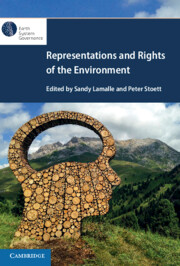Book contents
- Representations and Rights of the Environment
- Series page
- Representations and Rights of the Environment
- Copyright page
- Dedication
- Epigraph
- Contents
- Illustrations
- Tables
- Contributors
- Preface
- Acknowledgements
- 1 An Introduction
- Part I Challenges
- Part II Recollection
- Part III Perspectives
- 10 Rights of Nature, a New Perspective in Law
- 11 Property for Nature
- 12 Reimagining the Common Law
- 13 Democratic Representation, Environmental Justice and Future People
- 14 The Normative and Social Dimensions of the Transition towards a Responsible, Circular Bio-Based Economy
- 15 New Perspectives on Guardianship of Nature
- Index
- References
12 - Reimagining the Common Law
Rights of Nature Tribunals and the Wild Law Judgment Project
from Part III - Perspectives
Published online by Cambridge University Press: 16 March 2023
- Representations and Rights of the Environment
- Series page
- Representations and Rights of the Environment
- Copyright page
- Dedication
- Epigraph
- Contents
- Illustrations
- Tables
- Contributors
- Preface
- Acknowledgements
- 1 An Introduction
- Part I Challenges
- Part II Recollection
- Part III Perspectives
- 10 Rights of Nature, a New Perspective in Law
- 11 Property for Nature
- 12 Reimagining the Common Law
- 13 Democratic Representation, Environmental Justice and Future People
- 14 The Normative and Social Dimensions of the Transition towards a Responsible, Circular Bio-Based Economy
- 15 New Perspectives on Guardianship of Nature
- Index
- References
Summary
Performance and performative writing can play a key role in opening up an extralegal space for new representations of non-human species and Earth itself. This is apparent in two recent initiatives: the Rights of Nature tribunals and the Wild Law Judgment project. The Rights of Nature tribunals constitute an unconventional performative forum for recognition of non- mainstream representations of Earth and its communities. The Wild Law Judgment project has provided an important space for unsettling anthropocentric assumptions and expectations in the common law. In ‘dressing up’ as judges, as tribunal members and judgment rewriters, we perform law differently to achieve Earth-centred outcomes.
Keywords
- Type
- Chapter
- Information
- Representations and Rights of the Environment , pp. 287 - 309Publisher: Cambridge University PressPrint publication year: 2023

